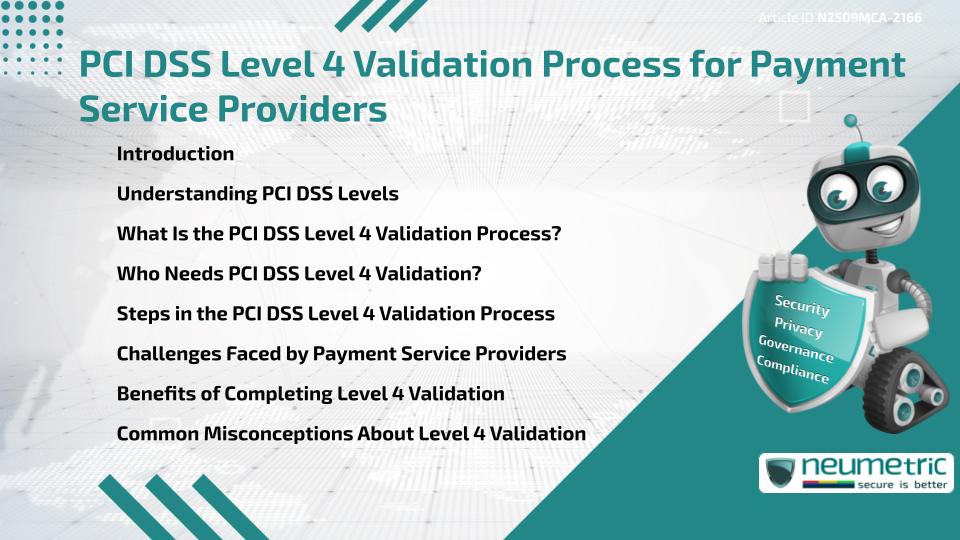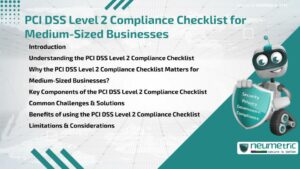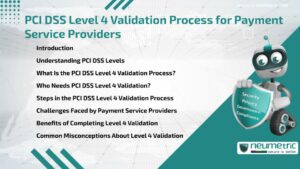Table of Contents
ToggleIntroduction
The PCI DSS level 4 validation process applies to merchants & payment service providers handling fewer annual card transactions. While smaller in volume, these Organisations must still comply with the Payment Card Industry Data Security Standard [PCI DSS] to protect Cardholder Data. This article explains the PCI DSS levels, details of level 4 validation, steps in the process, challenges, benefits & common misconceptions.
Understanding PCI DSS Levels
PCI DSS Compliance is categorized into four levels based on the annual transaction volume. According to PCI Security Standards Council, the levels are:
- Level 1: Over six (6) million transactions annually.
- Level 2: Between one (1) million & six (6) million transactions annually.
- Level 3: Between twenty thousand (20,000) and one (1) million transactions annually.
- Level 4: Fewer than twenty thousand (20,000) e-commerce transactions annually or up to one (1) million total transactions annually.
What is the PCI DSS Level 4 Validation Process?
The PCI DSS level 4 validation process is designed for small merchants & service providers. Unlike Level 1, which requires an onsite Audit by a Qualified Security Assessor [QSA], Level 4 Organisations can validate compliance using a Self-Assessment Questionnaire [SAQ] and sometimes quarterly network scans. However, requirements may vary depending on the acquiring bank or payment brand.
Who needs PCI DSS Level 4 Validation?
Merchants that handle a relatively small number of transactions annually & payment service providers that fall under Level 4 thresholds must complete the PCI DSS level 4 validation process. Even though transaction volumes are lower, these businesses remain targets for fraudsters due to potentially weaker Security Measures. Visa’s compliance guidelines emphasize the importance of compliance across all levels.
Steps in the PCI DSS Level 4 Validation Process
The PCI DSS level 4 validation process typically involves:
- Completing the SAQ: Choosing the correct Questionnaire type based on how payment data is handled.
- Conducting quarterly scans: Engaging an Approved Scanning Vendor [ASV] if systems connect to the internet.
- Implementing required controls: Applying measures like encryption, firewalls & strong authentication.
- Submitting Evidence: Providing the completed SAQ & scan results to acquiring Banks.
Additional guidance on the steps is available from SecurityMetrics.
Challenges Faced by Payment Service Providers
Even at Level 4, Organisations often face challenges such as:
- Limited technical expertise to interpret PCI DSS requirements.
- Budget constraints for implementing secure technologies.
- Confusion over which SAQ applies to their environment.
- Ongoing effort required to maintain compliance year after year.
The ISACA Framework overview offers insights into addressing these challenges effectively.
Benefits of Completing Level 4 Validation
Despite the challenges, the PCI DSS level 4 validation process delivers key benefits:
- Strengthens security for Customer payment data.
- Reduces Risk of breaches & associated Financial penalties.
- Builds Customer Trust & credibility.
- Meets requirements of Banks & card brands to continue processing payments.
Further information is available on PCI SSC’s merchant page.
Common Misconceptions About Level 4 Validation
A common misconception is that Level 4 validation is optional due to lower transaction volumes. In reality, all merchants & service providers must comply with PCI DSS, regardless of size. Another misconception is that once validated, compliance is permanent. Ongoing monitoring, updates & annual SAQ submissions are necessary to maintain compliance.
Takeaways
The PCI DSS level 4 validation process is crucial for smaller merchants & payment service providers. Although less intensive than higher-level audits, it ensures that Organisations maintain essential Security Controls. Compliance not only fulfills regulatory obligations but also builds trust & protects against Financial & reputational harm.
FAQ
What is the PCI DSS level 4 validation process?
It is the compliance process for merchants & service providers with fewer transactions, validated through a Self-Assessment Questionnaire & sometimes scans.
Who must complete PCI DSS Level 4 validation?
Small merchants & payment service providers processing fewer than twenty thousand (20,000) e-commerce transactions annually or up to one (1) million total transactions.
How is PCI DSS Level 4 different from Level 1?
Level 1 requires onsite audits by a Qualified Security Assessor, while Level 4 typically involves self-Assessment & quarterly scans.
What challenges do Level 4 Organisations face?
Challenges include lack of technical expertise, limited budgets, confusion over SAQs & the need for continuous compliance efforts.
Does PCI DSS Level 4 compliance guarantee security?
No, it provides a strong baseline of protection but does not eliminate all Risks. Continuous Monitoring & updates are required.
How often must Level 4 validation be renewed?
Validation must be completed annually & quarterly scans are required for systems connected to the internet.
What happens if a business skips Level 4 validation?
Failure to comply can lead to fines, increased transaction fees, suspension of payment processing & reputational damage.
Need help for Security, Privacy, Governance & VAPT?
Neumetric provides organisations the necessary help to achieve their Cybersecurity, Compliance, Governance, Privacy, Certifications & Pentesting needs.
Organisations & Businesses, specifically those which provide SaaS & AI Solutions in the Fintech, BFSI & other regulated sectors, usually need a Cybersecurity Partner for meeting & maintaining the ongoing Security & Privacy needs & requirements of their Enterprise Clients & Privacy conscious Customers.
SOC 2, ISO 27001, ISO 42001, NIST, HIPAA, HECVAT, EU GDPR are some of the Frameworks that are served by Fusion – a SaaS, multimodular, multitenant, centralised, automated, Cybersecurity & Compliance Management system.
Neumetric also provides Expert Services for technical security which covers VAPT for Web Applications, APIs, iOS & Android Mobile Apps, Security Testing for AWS & other Cloud Environments & Cloud Infrastructure & other similar scopes.
Reach out to us by Email or filling out the Contact Form…





